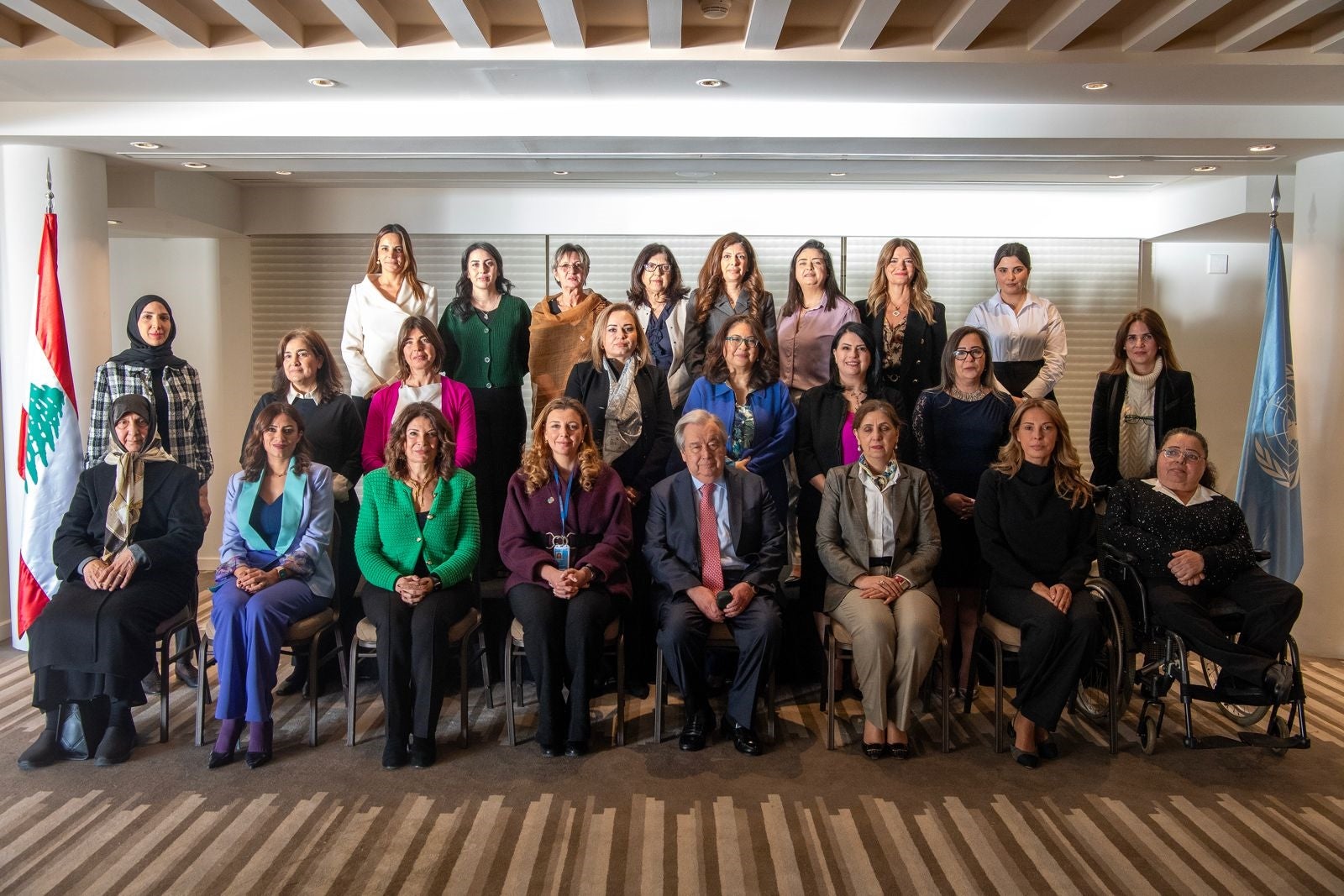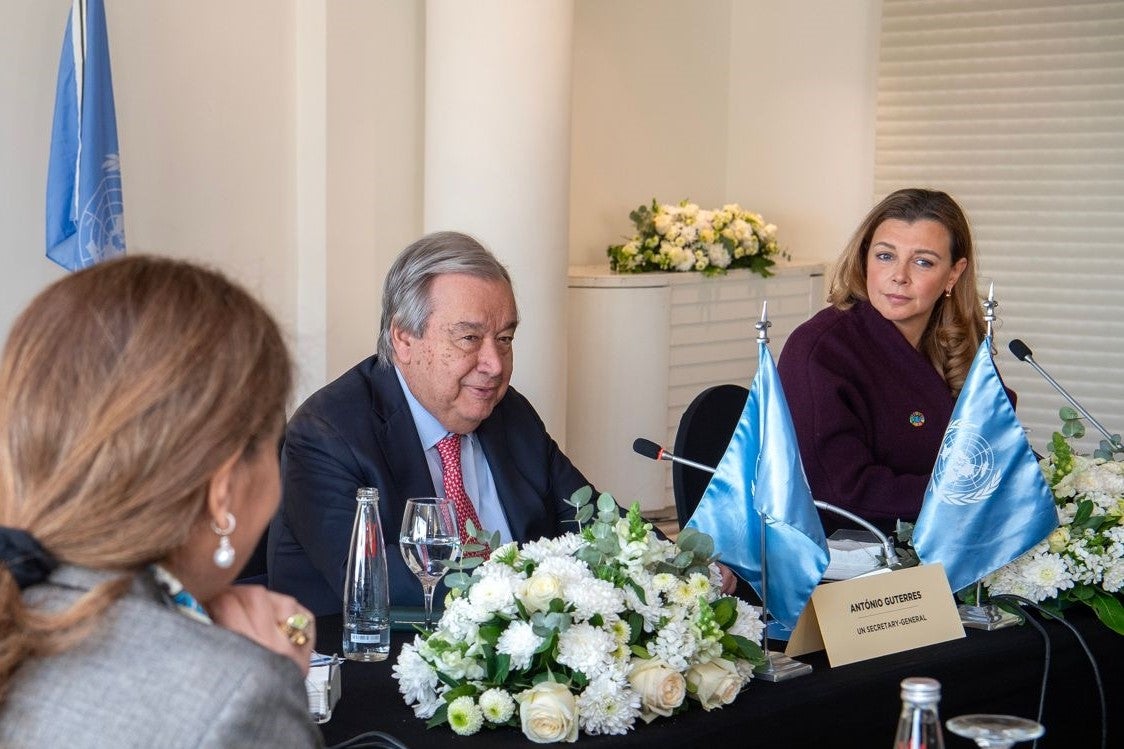As part of UNSG António Guterres’ visit to Lebanon, UN Women organized a dialogue with women-led organizations on their visions for the new government as well as their perspectives on recovery and reconstruction
Date:
(Beirut, Lebanon – 18 January 2025). UN Women welcomed the visit of United Nations Secretary-General António Guterres to Lebanon as a pivotal moment to advocate for gender-responsive reforms in the country’s governance and recovery, reconstruction and reconciliation processes.
This visit follows the recent election of General Joseph Aoun as President of the Republic of Lebanon and the appointment of Judge Nawaf Salam as Prime Minister, ending more than two years of political deadlock. The Secretary-General’s visit presents a crucial opportunity to elevate women’s voices in Lebanon’s political landscape, particularly as the new Government takes on the challenges of socio-economic recovery and the enforcement of the 27 November 2024 ceasefire.
As part of his visit, the Secretary-General participated in a dialogue organized by UN Women Lebanon. The meeting convened 20 leading women’s rights activists and representatives of feminist civil society organizations as well as environmental activists and young women peacebuilders that are working across the country to address the needs and challenges of their society across the humanitarian, development and peace dimensions. The meeting was attended by the United Nations Special Coordinator for Lebanon, Jeanine Hennis-Plasschaert.
“Now is the moment to fight. Fight to defend the presence of women in decision-making bodies in the reconstruction process. We will be entirely by your side, as this is a necessity for Lebanon,” said Guterres.
The discussion focused on the critical reforms needed to advance gender equality in Lebanon. The meeting served as a platform for diverse women leaders to present their key demands to the new Government, to ensure that Lebanon’s recovery, reconciliation and reconstruction efforts are gender-responsive and inclusive.

“The very fact you acknowledged the need for this meeting is a glimmer of hope” said Rabab Sadr, Chairperson at Imam Sadr Foundation “Confident, empowered and engaged women are key for Lebanon’s sustainable peace.”
“Lebanon has experienced eight recovery attempts and each failed to bring lasting peace. These attempts failed because they were not inclusive of women’s voices. Women’s leadership in government is necessary for truly democratic institutions”, added Lamia Bissat, President of the Institut des Finances Basil Fuleihan.
With only 6 per cent of women currently in Parliament and 5 per cent in municipal councils, Lebanon remains far from achieving the minimum benchmark of 30 per cent of women in governance structures. The need for urgent reforms to ensure women’s equal participation in political decision-making is pressing in light of the forthcoming municipal elections in May 2025 and parliamentary elections in 2026. Participants also touched upon other key priorities that need to be addressed, including: the rehabilitation of Lebanon's food sector and the urgent need to restore the devastated lands in the South, polluted as a result of the recent escalation; the inclusion of people with disabilities, including by repairing damaged infrastructure with accessibility in mind; protecting the most vulnerable women, such as Palestinian women refugees, by adopting long-needed gender-sensitive reforms on personal status legislation, currently fragmented across religious and nationality lines; the need for accountability after the conflict in line with international law.

Gielan Elmessiri, UN Women Representative in Lebanon, welcomed the visit of the UN Secretary-General at this important moment to underscore the need for bold decisions to protect and uphold women’s rights by implementing long-standing reforms in line with Lebanon’s constitution and international human rights commitments.
“The Secretary-General’s interaction with local women leaders will help elevate their contributions and needs and bolster their protagonism as key actors in the upcoming recovery and reconstruction process. It also reinforces the UN commitment to gender equality as a fundamental element in Lebanon’s recovery and sustainable development at a time when this message is crucial,” said Elmessiri.
UN Women calls on Lebanon’s new political leadership to seize this historic moment to implement long-standing gender reforms, fostering an inclusive governance framework that empowers women and strengthens their role in shaping the country’s future.
For media inquiries, please contact:
Roula Rached: [ Click to reveal ]
UN Women Lebanon Country Office
***